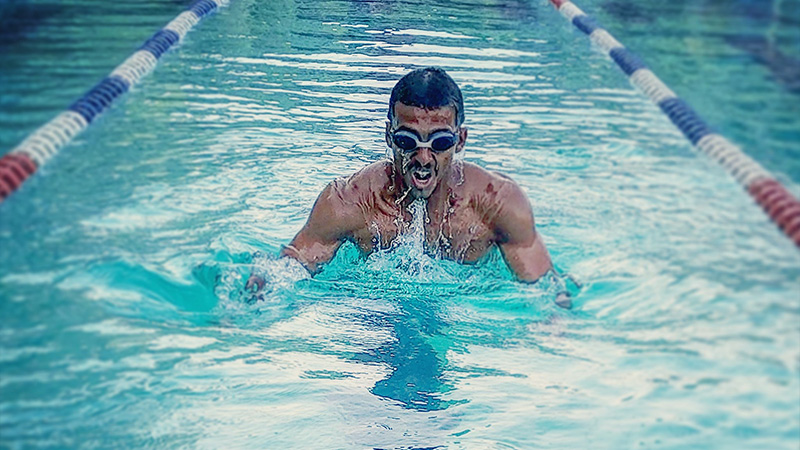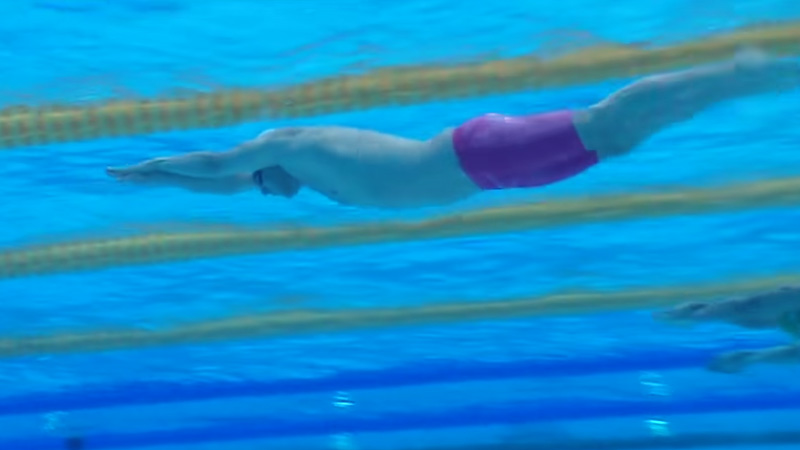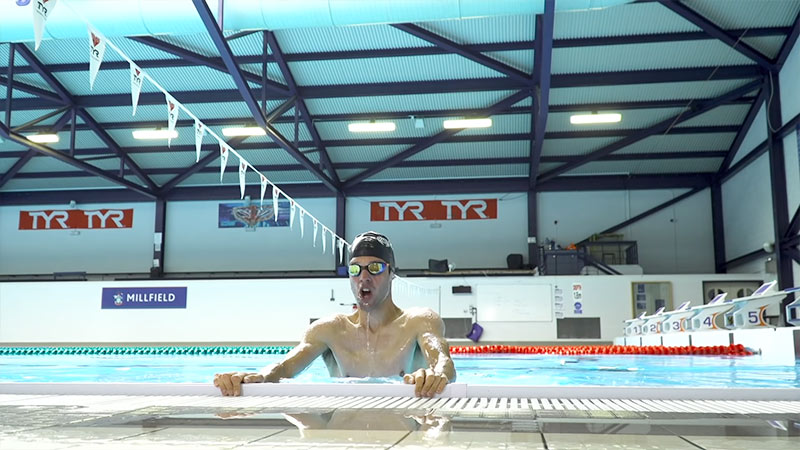There’s something invigorating about plunging into a swimming pool, feeling the cool embrace of the water, and momentarily escaping the world above. But amid the thrills and laps, it’s all too easy to swallow a mouthful of pool water.
While typically harmless, these inadvertent sips can sometimes introduce more than just water to our systems. From commonly used chemicals like chlorine and bromine to less welcomed guests such as Cryptosporidium or E. coli, pool water can carry elements we’d rather not ingest.
So, what should you do if you accidentally swallow some? This guide dives into the answers, ensuring your swim remains as refreshing as intended.
Potential Symptoms After Accidentally Swallow Pool Water
If you accidentally swallow pool water, you may be exposed to pool chemicals, such as chlorine, and potential pathogens that might be present. Here are the potential symptoms that can arise:
Chemical-Related Symptoms
- Throat Irritation: A scratchy or sore throat may develop shortly after swallowing chlorinated water.
- Stomach Upset: This can range from mild discomfort or bloating to more pronounced pain.
- Nausea or Vomiting: The stomach might react negatively to the chemicals, especially if a significant amount of water was ingested.
- Coughing: If some water goes into the respiratory tract.
- Burning Sensation: In the mouth or throat, especially if the pool’s chemical balance is not optimal.
Pathogen-Related Symptoms
Even well-maintained pools can sometimes harbor pathogens, especially if there has been recent fecal contamination.
- Diarrhea: Can be watery and persistent; in some cases, it might contain blood or mucus.
- Stomach Cramps or Pain: This can be intermittent or continuous.
- Nausea and Vomiting: Some pathogens can cause pronounced nausea.
- Fever: An indication of an infection.
- Headache: Often accompanies fever and other symptoms of infection.
Specific pathogens that might be present in pool water and their symptoms include:
- Cryptosporidium (Crypto): This can cause watery diarrhea, stomach cramps, dehydration, nausea, vomiting, fever, and weight loss.
- Giardia: Symptoms can include diarrhea, gas, greasy stools, stomach cramps, and dehydration.
- E. coli: This can lead to severe diarrhea (often bloody), abdominal pain, and vomiting.
- Shigella: Causes diarrhea (which can be bloody), fever, and stomach cramps.
- Norovirus: This leads to stomach pain, nausea, diarrhea, and vomiting.
General Discomfort
- Taste: The residual taste of pool chemicals might linger for a while.
- Feeling Unwell: A general sense of malaise or feeling under the weather might persist for a short period.
What To Do If You Accidentally Swallow Pool Water?

If you accidentally swallow a small amount of pool water, in most cases, there’s little cause for immediate concern. Pools are treated with chemicals like chlorine to disinfect and kill harmful pathogens.
However, if you experience any discomfort or symptoms afterward, there are some steps to consider:
Stay Calm
Ingesting a small amount of chlorinated pool water is generally not harmful. However, large quantities or swallowing water from improperly maintained pools can be more problematic.
Drink Fresh Water
Rinse your mouth with fresh water and drink a small amount to help dilute any pool chemicals or contaminants you might have swallowed.
Drinking Milk
If you accidentally swallow pool water, drink milk to help dissolve the chlorine. Drinking milk will also help with hydration and stomachaches from the chlorine.
It is best to seek medical attention if symptoms persist or worsen after drinking milk. Chlorine can cause skin irritation, headaches, and nausea in some people- always consult a doctor if these occur while swimming in pools or hot tubs.
You may also want to consider wearing a nose clip when swimming as this will prevent chlorine from entering your lungs
Monitor for Symptoms
Be aware of any signs of gastrointestinal distress, such as stomach pain, nausea, diarrhea, or vomiting. Some pool-borne pathogens can have incubation periods ranging from several hours to several days. Common pathogens in pools that can cause gastrointestinal problems include Cryptosporidium, Giardia, E. coli, Shigella, and norovirus.
Seek Medical Attention if Needed
If you experience severe or prolonged symptoms, especially after swallowing a large amount of pool water or water from an improperly maintained pool, see a doctor. Describe the situation so they can provide appropriate advice and treatment.
Practice Prevention
In the future, try to keep your mouth closed when swimming or playing in the water, and teach children to avoid swallowing pool water. If you’re responsible for maintaining a pool, ensure that it’s appropriately chlorinated and that the chemical balance is regularly checked.
Report Concerns
If you suspect that a public pool is not being maintained correctly or if you become ill after swimming, consider reporting your concerns to the relevant local health department. They can investigate and ensure that the pool is safe for others.
How Long After Swallowing Pool Water Can You Get Sick?

Swallowing pool water can be harmful to your health, especially if the water is contaminated with bacteria or parasites. Some of the common pathogens that can cause recreational water illnesses (RWIs) are **Giardia**, **Cryptosporidium**, **Shigella**, **E. coli** and **Pseudomonas aeruginosa** . These can cause symptoms such as diarrhea, vomiting, fever, rash, ear pain, and neurological problems.
The symptoms of RWIs can appear within a few hours or up to 72 hours after swimming. If you experience any of these symptoms, you should contact your doctor immediately and avoid swimming for at least two weeks. Children are more likely to get sick than adults, and young kids are at greater risk than older kids.
To prevent RWIs, you should avoid swallowing pool water or getting it into your ears or nostrils. You should also shower before and after swimming, and avoid swimming in poorly maintained or disinfected pools. Some pathogens can resist chlorine or thrive in warm water, so you should be careful even in chlorinated pools or hot tubs.
Can I Get Sick From Swallowing Pool Water?
Yes, you can get sick from swallowing pool water if it contains harmful pathogens or if the water has an improper balance of pool chemicals. Here are some potential risks:
Chemical Exposure
Pools are treated with chemicals, primarily chlorine or bromine, to disinfect and prevent the growth of harmful microorganisms. If the chemical balance is off, swallowing pool water can lead to minor gastrointestinal symptoms, like nausea or stomach discomfort.
Ingesting a large quantity of highly chlorinated water might cause more severe symptoms, such as throat irritation, vomiting, and even chemical burns in the esophagus.
Bacterial or Viral Infections
Even in chlorinated pools, certain bacteria and viruses can survive and pose a threat to swimmers. Some of the common pathogens include:
- E. coli: Typically causes diarrhea, stomach cramps, and vomiting.
- Cryptosporidium (Crypto): This can lead to watery diarrhea, stomach pain, and fever. Crypto is particularly concerning because it’s resistant to chlorine and can survive in well-maintained pools for days.
- Giardia: Causes diarrhea, gas, and stomach cramps.
- Shigella: This leads to diarrhea (sometimes bloody), fever, and stomach pain.
- Norovirus: Causes stomach and intestines inflammation, leading to stomach pain, nausea, and diarrhea.
Protozoan Infections
Some protozoa, such as Entamoeba histolytica, can be present in contaminated pool water and cause illness.
Other Concerns
Blue-green algae in poorly maintained pools can produce toxins that lead to symptoms like skin irritation, stomach cramps, vomiting, diarrhea, fever, sore throat, and headache.
Can Swallowing Pool Water Make Your Stomach Hurt?
Yes, swallowing pool water can make your stomach hurt for a couple of reasons:
Chemical Irritation
Pools are treated with chemicals like chlorine to kill bacteria and other pathogens. If the pool’s chemical balance is off or if a significant amount of water is swallowed, the chemicals can irritate the lining of the stomach and cause discomfort, nausea, or even vomiting.
Ingestion of Pathogens
Even with proper chlorination, some pathogens can survive in pool water, especially if there has been fecal contamination. Swallowing water contaminated with bacteria, viruses, or protozoa can lead to gastrointestinal infections.
Common symptoms include stomach pain, diarrhea, nausea, and vomiting. Some common pathogens that can be found in pools and cause gastrointestinal distress include Cryptosporidium, Giardia, E. coli, Shigella, and norovirus.
Treatment of Accidentally Swallow Pool Water
The treatment mainly focuses on managing potential symptoms arising from exposure to pool chemicals or pathogens present in the water. Here’s a recommended course of action:
Sorry for the interruption. I’ll continue the treatment advice.
Pathogen-Related Symptoms Treatment (continued):
- Fever: Over-the-counter fever reducers and pain relievers, such as acetaminophen or ibuprofen, can help. Make sure to follow the recommended dosage and be aware of any contraindications. Always consult with a healthcare provider if unsure.
- Seeking Medical Attention: If symptoms like diarrhea or vomiting are persistent, severe, or if there’s any sign of dehydration (dry mouth, extreme thirst, dark urine, dizziness), it’s crucial to consult a healthcare professional. They might prescribe specific treatments or medications based on the symptoms or suspected pathogens.
Hydration
Staying hydrated is one of the most important steps, especially if you’re experiencing diarrhea or vomiting. Water, oral rehydration solutions, and electrolyte drinks can be beneficial. Avoid caffeine or overly sugary drinks, as they can exacerbate dehydration.
Dietary Adjustments
- Eating bland foods like bananas, rice, applesauce, and toast (often referred to as the BRAT diet) can be soothing for an upset stomach.
- Avoid spicy, oily, or dairy-heavy foods until your symptoms subside.
Rest
Your body might need some time to recover, especially if you’re feeling unwell. Ensure you rest adequately.
Monitor Symptoms
Keep track of any symptoms and their severity. This can be helpful if you need to see a doctor, as it gives them a clearer picture of the progression of your condition.
Prevention for the Future
Remember to be cautious while swimming and try to avoid swallowing pool water in the future. Educate children on the importance of not ingesting pool water as well.
FAQs
Can the pH level of a pool impact its safety if ingested?
Yes, the pH level can impact how corrosive or irritating the water may be. Ideally, pool water should have a pH level between 7.2 and 7.8 to be safe for the skin and eyes. If swallowed, water outside this range might cause more irritation to the throat and stomach.
What other chemicals, besides chlorine and bromine, might be present in pool water?
Pools can contain algaecides, water clarifiers, stabilizers like cyanuric acid, and sometimes even salt in saltwater pools. All of these are generally safe in regulated amounts but could pose issues if ingested in large quantities.
Is a saltwater pool safer to swallow than a chlorine pool?
Saltwater pools use salt to generate chlorine. The salt content might make the water taste saltier and slightly more palatable, but swallowing it can still expose you to chlorine and potential pathogens. While it might be gentler on skin and eyes, the risk associated with ingestion is relatively similar.
Is pool water ingestion riskier for certain populations, like pregnant women or the elderly?
While swallowing a small amount of pool water is generally harmless for most people, certain populations like the elderly, very young children, pregnant women, or those with compromised immune systems might be more susceptible to any pathogens that could be present.
To Recap
Swimming remains one of the most delightful recreational activities, offering both leisure and health benefits. While the occasional accidental swallow of pool water can be concerning, it’s worth noting that most swimming experiences are safe and enjoyable.
However, being informed and maintaining a hint of caution can transform these minor hiccups into lessons for safer future dives. So, as you glide through the water, take comfort in its general safety, but also empower yourself with knowledge.
By doing so, you ensure that each dip in the pool is as refreshing, invigorating, and positive as it should be. Dive in with confidence!







